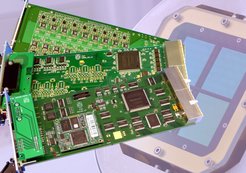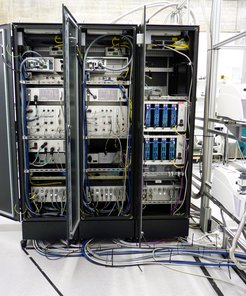Electronics department

In-house readout electronics for infrared and CCD detectors.
With steadily increasing telescope sizes and the growing complexity of scientific instruments, there is an ever-growing demand for improved astronomical cameras and electronic controlling of instruments. The control electronics for such cameras has been designed and built in the Electronics Department since the beginning of the Max Planck Institute for Astronomy. Much equipment has already been in operation for many years in the most powerful observatories in the world while much more are being developed or planned.
Tasks of the Electronics Department

19” unit with PLC (programmable logic controller) modules and internal cabling.
The work that is done in this department is as manifold as astronomical instrumentation in general. The main tasks are listed below:
System design:
- Design of control electronics and detector readout systems for instruments for astronomical observatories
- Estimation of time schedule, cost, and manpower requirements for project realization
- Hazard analysis, reliability, availability, maintainability and safety assessment of electrical equipment

Cold optical bench and cryogenic cabling of the MATISSE cryostat.
Development of custom equipment:
- Readout electronics for infrared and CCD detectors
- Control systems for motorized precision actuators
- Measurement and control equipment for temperature, pressure, flow, electrical power, etc.
- Implementation of safety functions and interlocks
Manufacturing and testing:
- Assembly and printing of circuit board layouts
- Manufacturing of cable harnesses for a variety of applications including cryogenic ones
- Integration of electronic devices in 19” chassis and assembly of complete cabinets

Instrument control electronic cabinets for the MATISSE project on the VLT.
Installation and commissioning:
- Installation, commissioning and support of electronic systems in the observatories
In order to deliver excellent electronics for astronomical instrumentation according to project deadlines on the one hand and to keep up with the rapid development of technology on the other hand, the electronics department has a 20-year long working partnership with graduate and undergraduate students. Several Bachelor and Master of Science students working on a thesis exploring different fields of information technology, electronics, and computer engineering have been mentored by the engineers of the department. The results and experience gained is often applied to the astronomical instruments.



